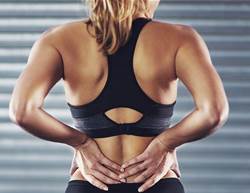Fact: Exercising can make you go.
Hitting the gym is one of these 20 best constipation remedies—and for good reason. Exercise stimulates bowel function and combats constipation by moving food through the intestine, explains Dr Edward Eichner. The best part is that any type of movement will do the trick, from swimming to Zumba and everything in between. Generally speaking, doing 30 minutes of aerobic exercise three times a week should be enough to keep you regular. For best results, be sure to drink at least 200mls of water every 20 minutes during your workout, as dehydration can make matters worse. (More on this later.)
Myth: Eating more fibre always helps.
Most people assume if they're backed up it's because they aren't eating enough fibre. While a lack of fibre in the diet can sometimes be to blame, loading up your plate with fruits, veggies, and whole grains isn't always the best solution. For doing so too quickly can make symptoms worse, according to the International Foundation for Functional Gastrointestinal Disorders.
Up your fibre intake by 5 grams every 3 days until you reach the recommended amount suggests gastroenterologist Dr Arthur Beyder. Women should aim for about 25 grams a day and men should shoot for 38 grams. You'll also want to increase your water consumption, as fluid helps high-fibre foods move through the digestive system and keeps fibre-related gas to a minimum. Which leads us to the next point...
Fact: Hydrating gets things moving.
When you're dehydrated, your body clings to water, which can cause dry, hard stools that are difficult to pass. Gastroenterologist Dr Robyn Karlstadt suggests drinking six to eight 200ml glasses of water daily to soften stools.
Myth: Sipping coffee can clear things up.
You may have heard that the caffeine in your daily cup of coffee can help you poop. But that's not always the case. "Caffeine is a stimulant, which means it can stimulate muscle activity in your colon," explains digestive health specialist Dr Lin Chang. The caveat is that caffeine can also be dehydrating. So if you tend to opt for caffeine over water, you may be doing more harm than good. If you want to give the ol' coffee-poop trick a try, be sure to have a glass of water both before and after.
Fact: Eating more often may be the answer.
Skipping meals can do more than cause fatigue, headaches, irritability, and brain fog. It can also make it harder to go to the bathroom, says gastroenterologist Dr Joanne Wilson. Eating stimulates the reflex that causes waste to move through the gut. That said, if you're skipping breakfast and lunch, nothing is moving during that time, and you won't be able to have a bowel movement. Aim to eat three meals and two snacks a day to stay regular.








